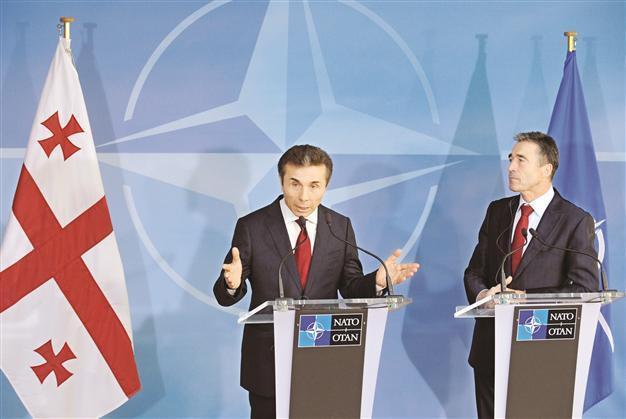Georgia at nuke smuggling center
BATUMI - The Associated Press

NATO chief Rasmussen (R) and Georgian PM Ivanishvili hold a conference in this photo. Georgia is under the spotlight for its position in the nuclear blackmarket. AFP photo
The nuclear black market remains active in countries around the former Soviet Union, most notably in Georgia, despite years of efforts and hundreds of millions of dollars spent fighting the illicit sale of nuclear contraband. Radioactive materials in the region, mostly left over from the Cold War, include nuclear bomb-grade uranium and plutonium, and dirty-bomb isotopes like cesium and iridium.
The extent of the black market is unknown, but a steady stream of attempted sales of radioactive materials in recent years suggests smugglers have sometimes crossed borders undetected.
Since the formation of a special nuclear police unit in 2005 with U.S. help and funding, 15 investigations have been launched in Georgia and dozens of people arrested.
Officials with the U.S. government and the International Atomic Energy Agency (IAEA) declined to comment on individual investigations, but U.S. President Barack Obama noted in a speech earlier this year that countries like Georgia and Moldova have seized highly enriched uranium from smugglers. An IAEA official, who spoke anonymously because he was not authorized to comment, said the agency is concerned smuggling is still occurring in Georgia.
Porous borders and povertyFour previously undisclosed cases, and a fifth, an arrest in Turkey announced by local officials, occurred this year. One from last year involved enough cesium-137 to make a deadly dirty bomb, officials said.
Also, Georgian officials see links between two older cases involving highly enriched uranium, which in sufficient quantity can be used to make a nuclear bomb. The Associated Press’ interviews with the two imprisoned smugglers in one case suggested that the porous borders and the poverty of the region contributed to the problem.
Georgia’s proximity to the large stockpiles of Cold War-era nuclear material, its position along trade routes to Asia and Europe, the roughly 360 kilometers of unsecured borders of its two breakaway republics, South Ossetia and Abkhazia, and the poverty of the region may explain why the nation of 4.5 million has become a transit point for nuclear material.Georgian officials say the radioactive material in the five new cases this year all transited through Abkhazia, which borders on Russia and has Russian troops stationed on its territory.
Russia maintains that it has secured its radioactive material, including bomb-grade uranium and plutonium, and that Georgia has exaggerated the risk because of political tension with Moscow.
But while the vast majority of the former Soviet Union’s nuclear arsenal and radioactive material has been secured, U.S. officials say that some material in the region remains loose. U.S. efforts to prevent smuggling have prioritized bomb-grade material because of the potential that a nuclear bomb could flatten a U.S. city. But security officials say an attack with a dirty bomb, explosives packed with radioactive material, would be easier for a militant to pull off.
Impact of attack would exceed Sept. 11Militant groups, including al-Qaeda, have sought the material to do so. A study by the National Defense University found that the economic impact from a dirty bomb attack of a sufficient scale on a city center could exceed that of the Sept. 11, 2011, attacks on New York and Washington.
The U.S. government has been assisting about a dozen countries believed to be vulnerable to nuclear smuggling, including Georgia, to set up teams that combine intelligence with police undercover work.
